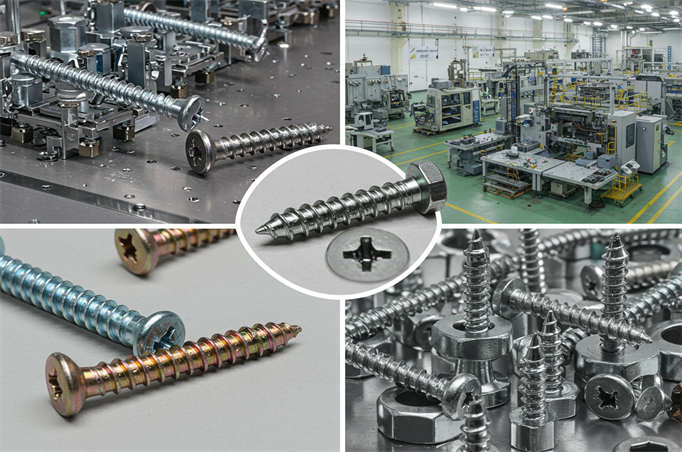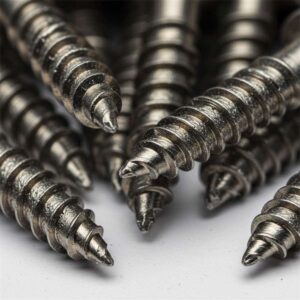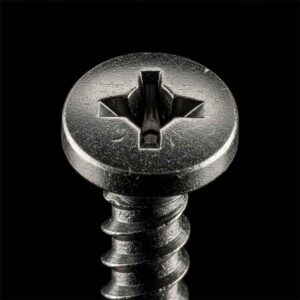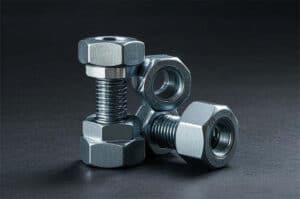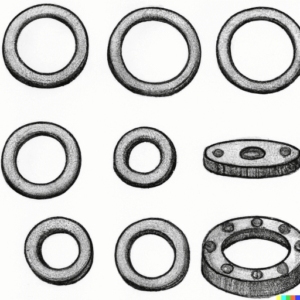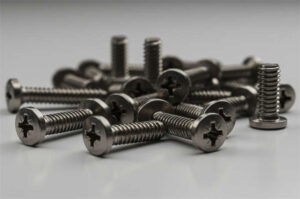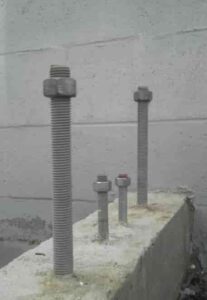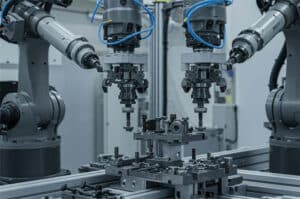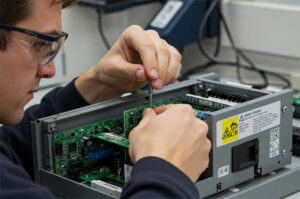Welcome to Prince Fastener, your reliable partner in industrial fasteners!
In the intricate realm of manufacturing and construction, the choice of fasteners is paramount to any project’s durability, functionality, and aesthetics. Among the vast array of fastening solutions available, sheet metal screws stand out as indispensable tools for connecting and securing metal sheets and components. At Prince Fastener, we understand that the correct sheet metal screws can make all the difference in the success of your projects. Whether you’re working on automotive assemblies, electronic enclosures, mechanical equipment, or even architectural structures, our premium sheet metal screws are designed to meet the most demanding requirements with precision and reliability.
Our sheet metal screws are crafted from high-quality materials such as carbon steel, stainless steel, alloy steel, and copper alloys, each offering distinct advantages for various applications. From full-threaded screws for robust metal-to-metal connections to self-tapping screws that simplify installation in hard-to-reach areas, we provide a diverse selection to cater to different industrial needs. Our commitment to innovation and quality ensures that every screw we produce meets stringent standards, enabling you to achieve optimal performance in your projects. At Prince Fastener, we are not just suppliers of sheet metal screws; we are your trusted allies in building the future of industrial excellence.
Sheet metal screws are essential fasteners we use for joining and tightening sheet metal. Here’s a detailed breakdown:
Classification Based on Function and Application
Full Thread Sheet Metal Screws: The entire shank features threads which bite deeply into the sheet metal. This provides strong holding power. We often use them to connect two pieces of sheet metal or materials like metal plates and plastics.
Self-Tapping Sheet Metal Screws: Their sharp point allows them to pierce sheet metal directly. You don’t need to pre-drill holes, making installation quick and easy. These are ideal for applications requiring fast assembly or where pre-drilling is difficult.
Clinching Studs (Press-Fit Screws): We press these into pre-drilled holes in the sheet metal using knurled teeth. This deforms the surrounding material to create a secure fastening. They are suitable for thin sheets or metal connections where high strength and stability are necessary.
Weld Screws: These feature a small head contact area for welding. You weld them onto the sheet metal to create a threaded stud. They are perfect for welding applications and provide powerful connections.
Captive Screws: We permanently fasten these to a panel using riveting or clinching. They can be freely screwed in and out without falling out, making them convenient for applications with frequent disassembly, such as electronic equipment enclosures.
Classification by Head Shape
Hex Head Sheet Metal Screws: The hexagonal head allows tightening and loosening with wrenches or similar tools. They offer high torque capacity and suit connections requiring high strength and stability.
Round Head Sheet Metal Screws: The rounded head provides a smooth, clean appearance. We recommend them for applications where aesthetics are important.
Flat Head Sheet Metal Screws: The neat, countersunk head sits flush with the mounting surface, providing a low-profile contour. They are ideal for space-limited areas or where a clean surface is required.
Materials
Carbon Steel: This offers low cost and good mechanical properties. After heat treatment, it achieves high strength and hardness. However, its corrosion resistance is lower, making it suitable for general-strength applications.
Stainless Steel: It boasts excellent corrosion and oxidation resistance. You can use it in harsh environments like humid or acidic conditions. Its strength and hardness are moderate, making it ideal for high corrosion resistance applications.
Alloy Steel: Offering high toughness, strength, and wear resistance, it’s suitable for high-temperature and high-pressure environments. However, its cost is higher, making it ideal for demanding industrial applications.
Copper Alloy: It provides good electrical and thermal conductivity and corrosion resistance. We often use it in electronic and electrical applications, though its strength and hardness are lower.
Selection Factors
Connection Strength: Choose screws with appropriate strength and rigidity based on the stress the sheet metal will experience. Carbon steel is often sufficient for general connections, while high-strength carbon or stainless steel is necessary for heavy-duty connections.
Application Environment: In corrosive environments like humid or acidic conditions, always select stainless steel, copper alloy, or screws with special surface treatments.
Ease of Use: If frequent disassembly is required, consider self-tapping screws or those with special tightening mechanisms for easy operation.
Space Constraints: In areas with limited installation space, consider extra-small or short screws. You might also opt for screws with special installation methods, such as clinch studs.
Appearance Requirements: For sheet metal with high surface quality demands, choose round head or flat head screws for a smooth and aesthetically pleasing finish.
What Are the Differences Between Sheet Metal Screws and Regular Screws?
While both sheet metal screws and regular screws serve to join and tighten, they have key differences in design, application, and function:
Tread Design:
- Sheet Metal Screws: The threads are generally coarser and designed to form or engage threads in thin metal. This helps provide better grip and strength in metallic materials. Some sheet metal screws are self-tapping, allowing them to drill their own pilot hole and form threads directly in the metal during installation.
- Regular Screws: The threads are relatively finer and intended for materials like wood, plastic, or light metals. They usually require pre-drilled holes or the use of nuts for tightening.
Head Shape and Size:
- Sheet Metal Screws: Heads come in various designs, such as hex, round, and flat, to suit different installation requirements and space constraints. Head sizes are generally larger to provide better torque-bearing capacity.
- Regular Screws: While head shapes vary, their sizes might be smaller because they are often used in softer materials requiring less torque.
Engagement Method:
- Sheet Metal Screws: They typically install directly into sheet metal, possibly requiring pre-drilled holes or using their self-tapping capability to create threads. Their design allows for a tight connection in metal sheets.
- Regular Screws: Primarily used for wood, plastic, etc., they often require pairing with nuts or pre-drilled holes. Their engagement method is more conventional and suited for non-metallic materials.
Strength and Durability:
- Sheet Metal Screws: Because they are used in metal, their design emphasizes strength and durability. They can withstand significant tensile and shear forces, making them suitable for industrial applications.
- Regular Screws: They generally have lower strength and are suitable for lighter connections and general purposes.
Application Scenarios:
- Sheet Metal Screws: Ideal for joining metal materials, especially in high-stress and stability applications like machinery manufacturing, building structures, and aerospace engineering.
- Regular Screws: Suitable for joining non-metallic or light metal materials in applications like home improvement, furniture, and light fixtures.
Materials and Surface Treatment:
- Sheet Metal Screws: Often made from high-strength carbon steel or stainless steel. Surface treatments like galvanizing or nickel plating enhance their corrosion resistance and lubricity.
- Regular Screws: The material range is broad, including steel, stainless steel, and brass. Surface treatments also vary but might focus more on aesthetics.
Where Are Sheet Metal Screws Used?
Sheet metal screws play a vital role in many industrial applications. Here are some common industries and their specific uses:
Automotive Industry:
- Body Structure Connections: We use them to connect metal frame components of car bodies, such as door structures and roof structures, ensuring the body’s strength and stability.
- Fastening Engine Compartment Components: They secure various metal parts within the engine compartment, such as engine brackets and compressor brackets.
Machinery Manufacturing:
- Equipment Base Assembly: They fasten the bases of large machinery to metal foundations, providing stable support.
- Chassis and Housing Connections: They join the metal chassis and internal equipment structures, protecting internal components and ensuring structural integrity.
Electronics and Communication Equipment:
- Network Cabinet Assembly: We use them to assemble the metal frames and panels of network cabinets, ensuring they are sturdy and reliable.
- Securing Communication Base Station Equipment: They fasten the metal housings, brackets, and internal components of communication base stations, ensuring efficient operation in various conditions.
Aerospace Engineering:
- Aircraft Component Assembly: Used in aircraft manufacturing to connect critical metal structural parts like wings and fuselages, meeting high strength and lightweight requirements.
- Fastening Engine Components: They secure metal parts of aircraft engines, such as engine mounts and exhaust pipes, ensuring reliability under high temperatures and pressure.
Home Appliances and Furniture:
- Securing Metal Housings: Appliances like refrigerators and washing machines fasten metal housings and internal supports.
- Metal Furniture Assembly: They join the frames and components of metal furniture, such as metal desks and bookshelves.
Is It Okay to Use Sheet Metal Screws in Wood?
Yes, you can use sheet metal screws in wood. However, consider these points:
Advantages:
- Higher Strength: Sheet metal screws are generally stronger than typical wood screws, providing better-holding power and load-bearing capacity.
- Self-Tapping Capability: Some sheet metal screws are self-tapping, allowing them to drill their own pilot hole and form threads in the wood, simplifying installation.
Disadvantages:
- Potential for Overtightening and Wood Damage: The coarser threads of metal screws can cause excessive splitting, especially in softer woods. This can damage the wood and weaken the connection.
- Not Ideal for Fine Woodworking: In woodworking, where aesthetics are crucial, the larger head and coarser threads of metal screws can create uneven surfaces or indentations.
Suitable Situations:
- When higher connection strength is required, such as in larger wooden structures like timber frame construction or pallet manufacturing.
- When faster installation is desired and the wood has higher density, such as joining hardwoods.
Unsuitable Situations:
- In applications where the appearance of the wood surface is critical, such as cabinet making or interior finishing. Wood screws or other more suitable connection methods are preferable here.
- In softer woods like pine or fir, metal screws can easily cause splitting and compromise the stability of the connection.
Are Metal Screws Suitable for Making Furniture?
Whether metal screws are suitable for making furniture depends on the specific type of furniture, its intended use, and aesthetic requirements. Here’s a detailed analysis:
Advantages:
- Strength and Stability: Metal screws can provide high connection strength and stability, making them suitable for larger furniture that needs to bear significant weight or external force. For example, when used in sofa frames, they can ensure the frame’s rigidity, allowing it to withstand prolonged use by multiple people.
- Durability: Metal screws often have good corrosion and oxidation resistance, making them durable and helping ensure the structural stability of the furniture over time.
- Ease of Assembly: Some metal screws have self-tapping capabilities, eliminating the need for pre-drilling in wood, making assembly faster and easier, which can increase furniture production efficiency.
Disadvantages:
- Aesthetics: Metal screw heads are generally larger, such as hex or round heads. After installation, they leave noticeable marks and indentations on the wood surface, affecting the furniture’s appearance and not aligning with the aesthetic standards of some furniture designs.
- Wood Damage: The coarser threads of metal screws can cause excessive splitting when driven into wood, especially softer woods. This can damage the wood and compromise the furniture’s structural integrity and overall quality.
- Unsuitable for Fine Woodworking: In fine woodworking furniture where high standards of wood surface finish are required, the use of sheet metal screws might be problematic due to their size and appearance, leading to uneven surfaces or indentations.
Suitable Scenarios:
- Minimalist or Industrial Style Furniture: This type of furniture often emphasizes basic functionality and has lower aesthetic requirements, highlighting metal textures and industrial characteristics. Metal screws can serve as a design element to showcase the furniture’s style and personality.
- Large or Load-Bearing Furniture: Sofa frames, bookshelves, and bed frames. These pieces require high connection strength and stability to ensure their reliability and service life, which metal screws can provide.
Unsuitable Scenarios:
- High-end furniture or Furniture with High Aesthetic Requirements, Such as solid wood dining tables, chairs, and beds. This type of furniture emphasizes the natural grain and texture of the wood and requires a refined and beautiful appearance. The use of metal screws would significantly detract from their overall aesthetic.
- Lightweight or Small Furniture, Such as small coffee tables or side tables. These pieces have lower weight, and generally, regular wood screws or other connection methods can meet their strength requirements. The strength of metal screws might cause excessive damage to the wood.
At Prince Fastener, we take pride in being at the forefront of fastener technology, delivering sheet metal screws that are engineered for precision, strength, and longevity. Our extensive product line covers various applications, from automotive and aerospace to electronics and furniture manufacturing. We recognize that each project has unique demands, which is why we offer customizable solutions and expert advice to help you select the perfect sheet metal screws for your specific needs.
When you choose Prince Fastener, you’re not just choosing a product; you’re choosing a partner dedicated to your success. We are committed to providing not only top-quality sheet metal screws but also exceptional customer service and technical support. Our team is ready to assist you in navigating the complexities of fastener selection, ensuring you make informed decisions leading to efficient and reliable assemblies.
Prince Fastener is a beacon of reliability and innovation in an industry where precision matters. We invite you to explore our comprehensive range of sheet metal screws and experience the difference that superior quality and dedicated service can make. Let’s build stronger, more enduring structures that stand the test of time. Contact Prince Fastener today and discover how our sheet metal screws can elevate your projects to new heights of excellence.
At Prince Fastener, we offer a wide range of sheet metal screws to meet your diverse needs. Contact us today to find the perfect fasteners for your applications!
